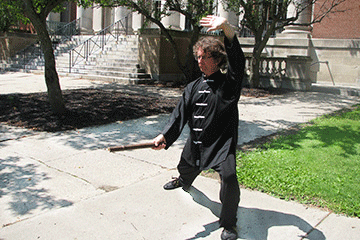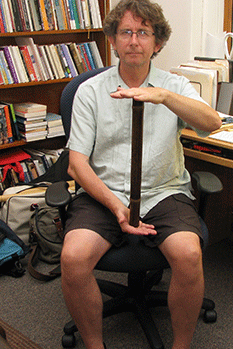Dance Study Applies to Global Conflict

07/28/2015
Millions of people believe that strengthening the connection between mind and body through activities like yoga, dance or tai chi can lead to inner peace.
SUNY Cortland philosopher Andrew Fitz-Gibbon wonders if it can lead to world peace as well.
Fitz-Gibbon, professor and chair of the College’s Philosophy Department, is part of a SUNY research team working to find out whether dance and other body-based arts can help families from different backgrounds overcome group prejudice, tension and conflict.
The team, made up of humanities faculty from Cortland and four other SUNY schools, was awarded a $20,000 grant for the project July 28. It was part of $160,000 in awards by the SUNY Arts and Humanities Network of Excellence announced by SUNY Chancellor Nancy Zimpher.
The funding, intended to foster research collaboration between SUNY institutions, will help support nine projects involving 14 different campuses in areas ranging from disability services to international diplomacy.
“In academic disciplines spanning dance, history, architecture, anthropology and many more, SUNY campuses across the state are creating new hands-on learning experiences for students and faculty in the arts and humanities,” Zimpher said. “We are proud to support these innovative projects.”
SUNY Cortland — along with SUNY’s Purchase, Geneseo, Buffalo State College and Brockport campuses — will pilot using creative dance and body movement opportunities in divided New York state communities to build a grassroots approach to conflict resolution, diplomacy and peace education.
Fitz-Gibbon, a tai chi instructor and director of SUNY Cortland’s Center for Ethics, Peace and Social Justice, has long held that physical movement can play a role in humanity’s peaceful co-existence.
He embraces the Eastern concept of loving one’s own body and brings a deep understanding of somaethetics, a branch of philosophy concerned with the relationship between mind and body, to the research project.
“Somaesthetics is new in western philosophy,” Fitz-Gibbon said. “It’s how we relate the mind to the body. Western philosophy generally has been about the mind. Eastern philosophy has had an equal emphasis on the mind and the body. So somaestheics is now the way some western philosophers are beginning to look at the mind and body connection, particularly through somatic practice; and tai chi is a kind of somatic practice.”
In both Japanese and Chinese tradition, the martial arts such as tai chi paradoxically are an instrument of peace, not war, he said.
“The more advanced you are in tai chi, the less violent,” he said.
 |
|
| Seated in his office, Andrew Fitz-Gibbon holds a Tai Chi bang, technically a weapon of this Chinese martial art that modern practitioners use to organize their peaceful movements. |
The team primarily will study how much collaboration on dance projects between families from refugee, immigrant or other populations and families from the mainstream culture around them can reduce tension and promote understanding and peace between the groups.
Led by principal investigator Nelly van Bommel, who is the interim assistant director of the Conservatory of Dance at SUNY Purchase, the team researching “Dance, Diplomacy and Peace for a New Generation of Artists” will work closely with Shawn Renee Lent, a social practice dance artist and technical expert.
The researchers will design a research project in Yonkers — and possibly in Buffalo — investigating how engagement in body-based arts experiences can positively impact conflict resolution and grassroots, people-to-people diplomacy. That type of broad-based, low-level approach encourages interaction and understanding between hostile communities and helps raise awareness and empowerment within those communities.
Lent has done similar research work in Northern Ireland and the former Yugoslavia, according to Fitz-Gibbon. She will engage young children from divided communities, countries that share reciprocal distrust, or areas of potential or actual violence in creating original dance moves apart from their own cultural traditions, Fitz-Gibbon explained. Parents and family then will be included in the dance collaboration to see if the project encourages harmonious co-existence among members of the larger community.
As much as possible, Fitz-Gibbon wants to draw SUNY Cortland faculty and students into the program. Findings from the one-year pilot study may trigger additional grants to allow the group to pursue a project of far greater scope, Fitz-Gibbon said.

